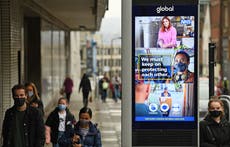Where would you suggest for a sunny November trip?
Simon Calder makes holiday recommendations, and answers your questions on ‘cooling-off periods’ for flight bookings – and whether it’s wise to travel at all during a pandemic


Q I am looking for somewhere hot for the end of November, where it’s relatively Covid-safe. I’m thinking Singapore. Would you suggest anywhere else?
Osman N
A Travelling somewhere warm in late November sounds heavenly. In normal times heading towards or beyond the equator in the coming month has the dual benefit of sunny skies and low prices – this being the lowest of all seasons.
But I am afraid that you must accept that this year horizons are severely limited by the coronavirus pandemic. You must take into account both the health restrictions imposed at the destination itself, and the UK government view – which currently rules out anywhere in Africa. While the Foreign Office advice does not have the force of law, it has the effect of invalidating travel insurance. And the quarantine rules are mandatory.
The range of destinations that offer warmth in November with few or no strings attached for British holidaymakers is fairly slim. The Maldives is open but expensive. Barbados and St Lucia are fairly light touch but require a certificate showing a negative PCR test for coronavirus before you board the flight, and have other restrictions on arrival. Cuba is probably the best bet in the Caribbean.
Let me try to manage your expectations for Singapore. The city state has kept Covid-19 infection rates extremely low, and intends to maintain that success. The only European country from which very limited and heavily restricted travel to Singapore will be allowed in the near future is Germany, which has signed a “green lane” agreement aimed at opening up business travel. But the conditions are extremely tough and not at all appropriate for a holiday.
Yet since you are looking to travel around four weeks from now, I recommend you watch developments for at least the next fortnight. I think there is a good chance that Africa may open up; Egypt would be an excellent choice for November. And for something cheap and cheerful, the Canaries or Madeira are always welcoming and warm.
Q Are people in England currently able to travel to Dublin for a weekend?
Ben O’S
A Even at a time when coronavirus infections are soaring across Europe, the technical answer is “yes”. But the Irish government and tourism authorities really do not want you to visit, and it would be a highly irresponsible decision to do so. This is a country with tight restrictions designed to limit the spread of Covid-19. Were you to go against all the official advice (and mine), the experience would be about as far from the typical weekend in Dublin as it is possible to imagine.
On arrival in the Republic from Great Britain, you are “requested to restrict your movements for 14 days”. The government says: “Do not use public transport if possible. Do not visit others. Do not go to the shop unless absolutely necessary.” While hotels, guesthouses and B&Bs are allowed to remain open, they may do so only to support provision of essential services. Weekend breaks do not count.
Bars, cafes and restaurants can provide only takeaways or deliveries. All pubs in Dublin are closed. There are also severe domestic travel restrictions for Irish citizens – including penalties for straying more than 5km from home without a permissible reason.
So please stay away for now; these “Level 5” restrictions will prevail until 1 December. Even then, it would be overambitious to assume that you will be able to travel to the Irish capital for a pre-Christmas break. Soon after the coronavirus pandemic took hold, Tourism Ireland’s chief executive, Niall Gibbons, told me he hoped that the country would be able to welcome overseas visitors by the autumn; the organisation now simply says: “We look forward to welcoming you back when the time is right.”
When that happens, there will a small bonus awaiting visitors: a one-third decline in VAT to 9 per cent; the price of a €5 pint of Guinness should sink by 20 cents before you sink it.
Q The current confusion over travel restrictions that you’ve reported on surely means there should be a “cooling-off period” for flights, just as there are for other purchases made online?
Emma S
A Yours is one of those questions where a number of people in the travel industry will just respond, “of course there’s no cooling-off period”. But it is well worth examining why that situation pertains – and the odd exception when it does not.
First, the general principle in the UK for anyone selling goods or services online is that “the customer can cancel their order up to 14 days after their order is delivered”.
The government says, though, that this does not apply to package holidays or any kind of transport ticket – air, rail, bus or sea.
Why not? Well, if you take the order being delivered as the journey taking place, clearly it cannot be returned to the supplier. (If it is not as planned, for example severely delayed or not as described, then you have other remedies under consumer legislation.) You could equally argue that the order being delivered is simply the email confirming your travel purchase. This begs the question: why not allow people to reflect on their plan? That is particularly appropriate in a time when there is the possibility of local lockdown preventing you from travelling, or a sudden quarantine requirement deterring you from doing so.
This apparent unreasonableness is down to the fundamentals of travel industry pricing. While holiday brochures and airline tariffs in the olden days showed fixed rates, pricing these days is fluid. What you pay depends on demand from other travellers, and how much the airline or tour operator thinks they can extract from customers before departure.
A cooling-off period would allow people to game the system. Typically, the earlier you book, the lower the price. If I buy a London-Athens flight for 15 days ahead for £200, the prevailing fare could have doubled by the day before travel. A two-week cooling-off period would allow me effectively to get a half-price deal, or cheerfully demand a full refund and leave the airline with an empty seat. Conversely, for a package holiday, I could pay £400 for a week in Greece, then check the day before to see if there has been a last-minute price cut. If there has, I cancel and immediately rebook.
Having said all that, there are some excellent voluntary cooling-off schemes, of which my favourite is British Airways: a no-quibble full refund within 24 hours of booking direct with ba.com. And yes, I do game the system, by checking towards the end of that 24-hour window if that price has changed. Most recently I saved over £100 on flights to Florida, when the fare fell overnight. It was handled with courtesy and aplomb by BA.
Q The tone of your article about Heathrow airport, following their dire financial results, was that the slump in air travel was a bad thing and that we should all start flying again. Given the fact that infection rates are surging across the UK, Europe and globally, surely we should now simply stop travelling? The last thing we need is to have more people flying around.
David F
A Many people will agree with you. Aviation allowed coronavirus to spread rapidly around the world. Inevitably, at either end of a route there will be different levels of infection, which has the potential to cause significant harm.
Others will relish the fact that summer activity at Heathrow slumped to levels last seen in 1967. The prediction is that next year will see a recovery only to passenger numbers of 1988. Residents around Heathrow and other major airports have certainly experienced the benefits of less aircraft noise and reduced pollution from aviation-related road traffic.
But many of them also work at the airport and face a bleak future. Aviation, according to Heathrow’s chief executive, John Holland-Kaye, is the economic engine that provides millions of jobs in the UK by connecting the country globally. Since the coronavirus pandemic began, inbound visitor numbers have dwindled to almost zero – damaging the prospects of staff everywhere from plush London hotels to the adventure operators in the Highlands and islands of Scotland.
The Department for Transport makes it clear that the government prioritises health above aviation, with a spokesperson saying: “Our priority has always been to protect the public and manage the risk of new cases being imported from abroad.” That explains the mandatory two weeks of self-isolation that is imposed on arrivals from almost every country to the UK.
At some point, though, like every other country the UK will have to find an appropriate balance between health-protection measures and the economic benefits bestowed by international travel. Of course the environmental impact of aviation should be part of that debate.
Email your questions to s@hols.tv or tweet @simoncalder









Join our commenting forum
Join thought-provoking conversations, follow other Independent readers and see their replies
Comments